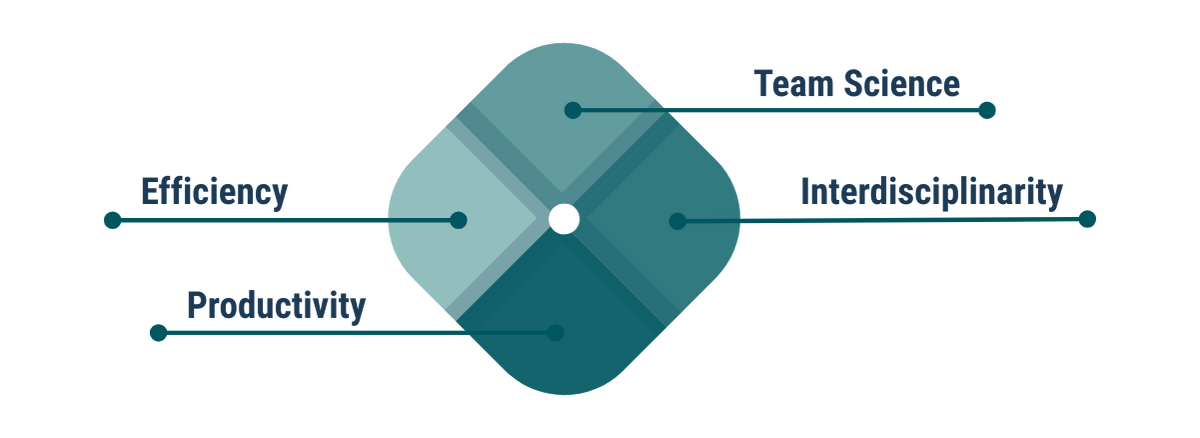The UTMB Health Pepper Center is comprised of six primary cores and components:
The Leadership and Administration Core (LAC) provides overall scientific and administrative leadership. The Research Education Component (REC) serves as the hub for our training program and Scholars. The Pilot and Exploratory Studies Core (PESC) is a key source of scientific innovation through the funding of pilot studies. Resource cores have been reorganized during this cycle to align with the updated OAIC theme. The Clinical and Community-based Research Resource Core (CCBR-RC1) has been modified to specifically support community-based research and community engagement activities. The Research Design, Analysis and Data Management Resource Core (RDAD-RC2) will now also support investigators at our partner institutions. The Technology-Enabled Research Resource Core (TERRC3) is a new core that will support the growing study and use of technology by OAIC investigators and trainees.Executive Committee Membership
Contact Us
The UTMB Health Claude D. Pepper Older Americans Independence Center (OAIC)
301 University Blvd.
Galveston, TX 77555-0177
Directions and Maps
Phone: (409) 747-0008
Email: aging.research@utmb.edu
Leadership and Administrative Core (LAC)
Core Co-Leaders: Melissa Morrow, PhD and James Goodwin, MD
The LAC provides scientific leadership, administrative infrastructure, and financial and regulatory oversight in support of the activities and growth of the UTMB OAIC. This core employs a shared leadership model that optimizes efficiency, productivity, team science, interdisciplinarity, and coherence with the OAIC theme.

The Specific Aims of the LAC are:
- Aim 1: Provide scientific leadership and direction toward the overall goals of the UTMB OAIC.
- Aim 2: Manage the UTMB OAIC program in compliance with applicable policies.
- Aim 3: Increase the UTMB OAIC impact locally and nationally.
Research Education Component (REC)
Core Co-Leaders: Raji, Mukaila, MD, MS, FACP, Kyriakos Markides, PhD, and Alan Landay, PhD
The REC has been dedicated to training leaders in geriatrics and gerontology since the UTMB OAIC's inception. This component has trained 41 Scholars. Eighty-five percent have secured external funding and have become leaders in healthcare, education, and aging research. The REC recruits and trains scholars that align with the UTMB OAIC’s evolving research focus, which has progressed from basic mechanisms of muscle aging to multi-site trials on improving functional recovery and now includes disparities contributing to functional decline in older populations.
.png?sfvrsn=50716155_0)
New to this cycle, the REC will expand its recruitment efforts to include highly promising investigators from local partner institutions, add an innovative, tailored approach to mentoring Scholars, and create a nurturing community for Scholars.
The Specific Aims of the REC are:
- Aim 1: Work with UTMB and its partner institutions to identify, recruit, and retain a pool of scholars with the potential for successful careers in aging and disparities research.
- Aim 2: Use an innovative “Precision Faculty Development” model to create a career and professional development program customized to each REC Scholar.
- Aim 3: Foster a community of REC Scholars to promote interdisciplinary collaborations, peer-to-peer support, and professional development for a successful career in aging research
Partner Institutions
Pilot and Exploratory Studies Core (PESC)
Core Co-Leaders: Neil Mehta, PhD, MSc, MA and Soham Al Snih, MD, PhD
The PESC serves as the innovation core of the UTMB OAIC, contributing to the Center’s goals by developing new translational research streams relevant to the UTMB OAIC theme. Since its inception in 2000, the PESC has funded 86 pilot projects, supporting 23 investigators during the current funding period. The PESC has a 56% success rate in completed pilot projects that generated additional external funding. In this renewal, the PESC will fund five projects annually, often co-funded by other UTMB Centers, Institutes, or Departments. We will award pilot projects to faculty at UTMB and our partner institutions, the Texas Southern University College of Pharmacy and Health Sciences (TSU) and the new University of Houston College of Medicine (UH).
The specific aims of the PESC are to:
- Enhance the research portfolio in UTMB OAIC thematic areas by funding innovative projects from investigators at UTMB, TSU, and UH to advance the science of aging and support careers in aging research; and
- Administer a structured project oversight and mentorship program that supports investigators in completion of their projects and their career advancement in aging research, including obtaining future extramural funding.
PESC Accomplishments2020 to 2024
- 23 Investigators funded (9 clinician-researchers, 6 social/behavioral scientists, 8 basic scientists
- 8 received external funding to date (4 R01s, 2 K01s, 2 R21s, and Foundational awards)
- 8 pilot awards co-funded with other UTMB Centers (CTSA, CeRPAN, RCMAR, CIRWH, BHI)
- 17 applications per year, on average
- 51 peer-reviewed publications to date
Clinical and Community-based Research Resource Core (CCBR-RC1)
Core Co-Leaders: Monique R. Pappadis, MEd, PhD, FACRM, Steven R. Fisher, PhD, PT, GCS, and Erin Hommel, MD, MS
The CCBR-RC1 continues as the primary UTMB OAIC resource for clinical research while expanding to support community-based research aimed at eliminating barriers to research participation for populations experiencing health disparities.

Our goal is to drive change in aging research by promoting excellence through evidence-based approaches across the study lifecycle, ensuring comprehensive study support, use of standardized regulatory procedures, and building trust and enduring relationships with the broader community.
In the new cycle, the CCBR-RC1 will support research on mechanisms underlying function loss and recovery, trajectories of physical function and disability in older adults, and the development and testing of novel treatments and technologies. Additionally, the Core will support bilingual community-based studies on chronic disease management and prospective, population-based studies on older adults with chronic disabling conditions.
The Specific Aims of the CCBR-RC1 are:
- Aim 1. Support clinical and community-based research relevant to the OAIC theme.
- Aim 2. Train and support OAIC Scholars and investigators on novel approaches to increase participation of underserved older adults in clinical research.
- Aim 3. Strengthen partnerships with internal and external collaborators to facilitate Specific Aims 1 and 2 and promote dissemination to communities of interest.
Community Advisory Board
Central to expanding CCBR-RC1 community partnerships is the established Community Advisory Board (CAB), which meets bi-monthly and is chaired by Rebecca Galloway, PhD, PT, GCS, CEEAA. The CAB provides a bi-directional platform to receive patient, caregiver, and community provider perspectives about OAIC research. The Board facilitates recruitment and retention in OAIC clinical trials, helps with dissemination of study results, and supports new research idea development through interactive meetings. The CAB maintains a membership of older adults with patient or caregiver experience, OAIC investigators, and healthcare providers and professional caregivers from nursing homes, home health agencies, and senior centers.Community Connection
A comprehensive communications program incorporates The UTMB Health Pepper Center website, Facebook, Blue Sky, mailing list, and community events calendar as an effective way to reach older adults and build a strong local presence in the aging community. Current clinical trials and research studies in recruitment are posted to our website and social media calendar.
Research Design, Analysis and Data Management Resource Core (RDAD-RC2)
Core Co-Leaders: Yong-Fang Kuo, PhD, Brian Downer, PhD, and Alejandro Villasante-Tezanos, PhD
The RDAD-RC2, formerly the Biostatistics and Data Management Resource Core, provides methodological, statistical, and analytical support to investigators conducting research within the UTMB OAIC’s theme. The Core will also train REC Scholars in rigorous and reproducible methods for aging research and develop novel study designs and analysis techniques to address health disparities. The Core will continue to include highly qualified faculty and staff with expertise in study design, data management, and statistical analysis across a range of research applications.

Core faculty have an established record of independent research and extensive experience developing and adapting innovative methods for experimental, observational, and interventional studies. Faculty whose research focuses on health disparities and methodologies essential for this work have been included. The RDAD-RC2 will also expand its efforts to facilitate investigators’ access to data for aging research and enhance its support to REC and Pipeline Scholars.
The Specific Aims of the RDAD-RC2 are:
- Aim 1: Collaborate as investigators on OAIC research, focusing on overcoming health disparities among older adults with chronic disabling conditions.
- Aim 2: Train early-career investigators in study design, data management, and data analysis essential for aging research.
- Aim 3: Develop novel methods to advance research on health disparities in older adults.
Technology-Enabled Research Resource Core (TERRC3)
Core Co-Leaders: Elizabeth Lyons, PhD, MPH, Missy Morrow, PhD, and Meredith Masel, PhD, MSW
The new TER-RC3 supports the UTMB OAIC in enhancing aging research by integrating technology that helps individuals with disabilities and other health disparities maintain independence and aids researchers in collecting accurate functional data. By prioritizing usability, the TER-RC3 ensures that older adults can easily engage with technology for interventions and data collection, which is vital for improving study fidelity. The Core will maintain a warehouse of wearable sensors (WEARHouse) and assessment laboratories, provide education and expertise in technology implementation in research, and refine technology through iterative usability testing with a Community Usability Board (CUB) through the following aims:
- Aim 1. Support the use of innovative technology in aging research studies.
- Aim 2. Provide education, training, and outreach for technology-enabled research.
- Aim 3. Assess the usability of technology and provide support for technology adaptation to address health disparities.

The WEARHouse: Wearable Sensor Resource for Researchers
The UTMB OAIC has extensive experience in using technology in aging research and adapting technology for specific functional needs. Reflecting national trends, there has been a significant increase in the use of and demand for technology in aging research at UTMB. Both investigators and their older participants may be unfamiliar or uncomfortable with the rapidly evolving field of technology. Specific methods are needed to adapt technology for use in older adults experiencing health disparities such as physical disability, language barriers, sex differences, and low education. TER-RC3 will serve as the home for researchers from the UTMB OAIC and partner institutions using technology in their research projects. Further, we will expand our resources to the larger UTMB Health System and national OAIC network. The TER-RC3 is a central component of the innovation of the UTMB OAIC, as it will support aging research using novel technologies and novel technology-enabled study designs.








